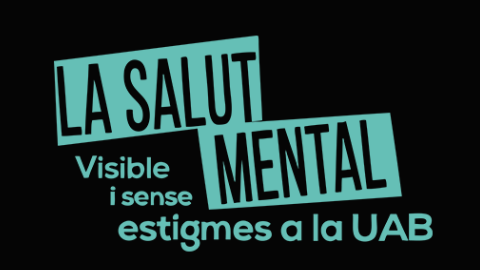The UAB celebrates World Mental Health Day and presents the Antiestigma Plan

08/10/2019
In the academic year 2017-2018, the UAB carried out the activities program focused on mental health, under the FMUAB17 slogan “Mental Health, visible and without stigma at the UAB”. Different actions were taken and several activities were organized throughout the year. In one of them, the UAB committed itself to elaborate the Antiestigma Plan.
So, on Thursday, 10th October, and in the occasion of the World Mental Health Day, the diagnosis of the Antiestigma Plan, which was carried out at the heart of the UAB community, was presented.
Sara Moreno, the vice-rector for Students and Employability, will introduce the event. Afterwards, the diagnosis of the plan will be announced, realized by a research team (composed by the students, Administrative and Service Staff, Teaching and Research Staff, members from different UAB services as well as the governing team). Three representatives of this group, along with Maria Lomascolo, from the entity Obertament, who led the work, will present in the first part of the Antiestigma Plan. Then, a student, person from the Service staff and person from the Teaching Staff will explain their personal experiences related to mental health. Finally, the UAB rector, Margarita Arboix, will close the event.
The Antiestigma Plan
During the event, it will be present how the diagnosis of Antistigma Plan has been established. This is the first part of the plan. It will be detailed who has been member of the research group, the methods they used to make the diagnosis, the previous experiences as well as a graphic with the participants, views, and perceptions. Moreover, the results of the survey done in the UAB community will be made known and the guidelines will be specified. Once the diagnosis is done, the second part of the plan will consist in the actions that will be undertaken.
According to the results of the survey, 14% of the people surveyed states to have experienced in first person a problem related to mental health. The survey has been done in a telematic and anonymous way during 2019. It has obtained nearly 2.000 answers. 71% of people surveyed are women and 66% are students.
Among the surveyed students, the 16% states to have or have had a mental disorder, whereas among workers, 10% states to have or have had one.
A person out of four
A person out of four will have problems related to mental health during their life. Even though the growing importance of this fact, mental health is still being invisible and stigmatized. On the one hand, the lack of visibility contributes to social unawareness and it makes more difficult to detect the symptoms of mental illness. On the other hand, this invisibility can contribute to generate rejection towards the people suffering a disorder and to fuel the taboo about mental health. The invisibility and the stigma hamper to provide the most appropriate response in each case and they are the basis of social discrimination.
The University is not isolated from society. The mental health problems are also present and they affect all collective, i.e., the students, the Administrative and Service Staff, and the Teaching and Research Staff. To provide a response and the appropriate attention to the specific academic needs to the students, as well as to the working specific needs to the Administrative and Service Staff, and the Teaching and Research Staff, it is essential to work to the mental health to be visible and without stigmas at Autonomous University of Barcelona. The social commitment of the public university requires an active role to progress to the change of attitudes and behaviors of society towards the people suffering mental health issues.